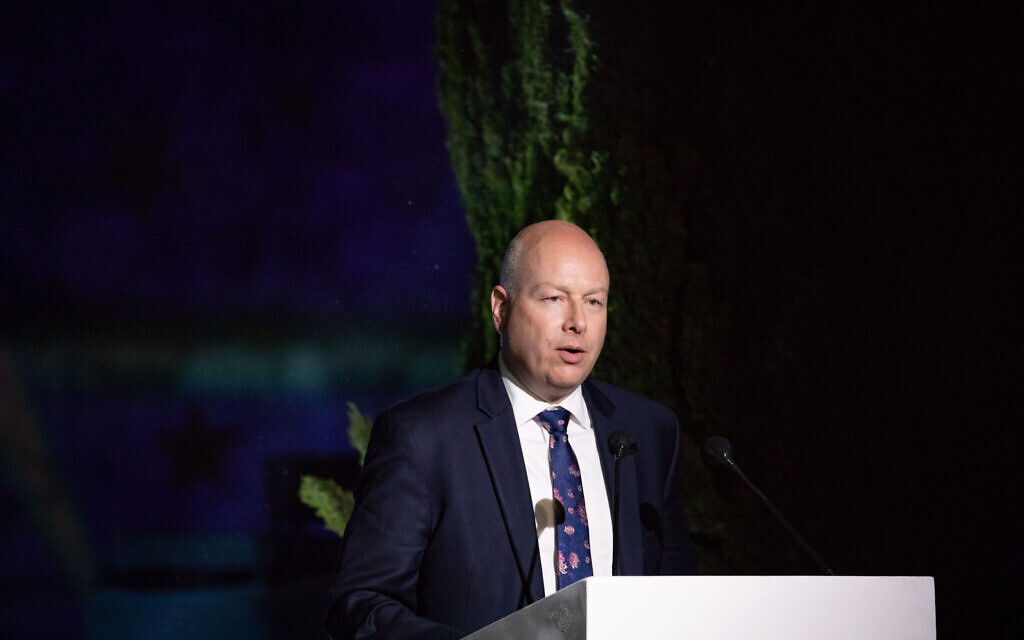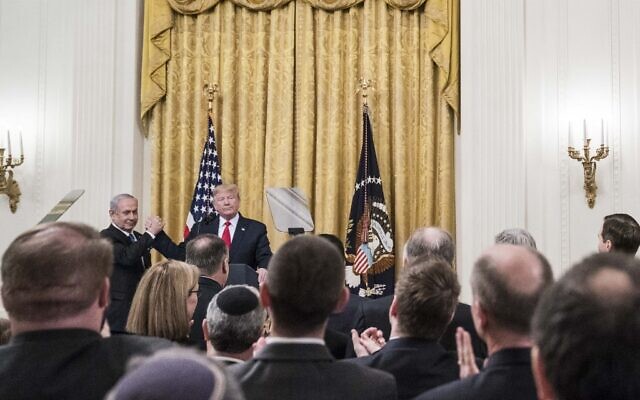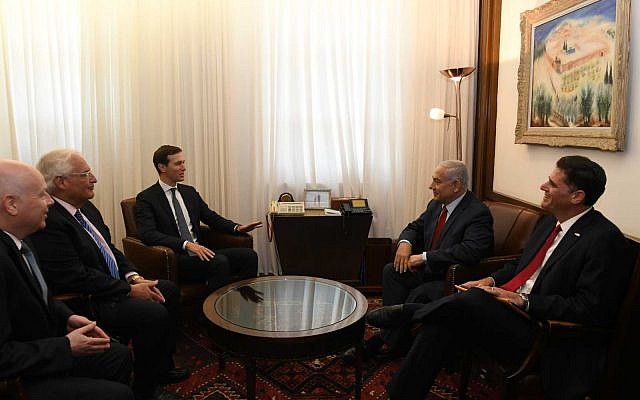Jason Greenblatt warns that if traditional positions on conflict are readopted: ‘Israel will likely continue to thrive and the Palestinians will continue to suffer’

The next US administration may very well repudiate US President Donald Trump’s so-called deal of the century, but if that happened and the traditional parameters of the peace process were restored, Israelis will continue to prosper while Palestinians will continue to suffer, Jason Greenblatt, one of the peace proposal’s co-authors, said this week.
“A future administration may disavow the plan. There is no avoiding that,” Trump’s former special envoy to the Israeli-Palestinian conflict told The Times of Israel in an email interview.
“But they will simply step right back into the morass of peace-making and if they stick with the traditional talking points, in all likelihood it will just be all talk and no action. Israel will likely continue to thrive and the Palestinians will continue to suffer.”
Greenblatt quit the administration in late October, just a few months before the administration’s peace plan was unveiled at the White House in the presence of Prime Minister Benjamin Netanyahu. Many Democrats, including all leading presidential candidates, harshly criticized the plan.
“The time has come to ask the hard question — are we here to help both sides get to a deal that works and improves their lives while maintaining everyone’s security, or do people want to just keep saying the same things over and over again and get nowhere,” Greenblatt told The Times of Israel in relation to the possibility of a Democrat entering the White House in January 2021.
“Those who do that do not help the Palestinians. They harm them, deeply,” he added.

After leaving the administration, Greenblatt, a former lawyer for the Trump Organization, joined the board of directors of the Republican Jewish Coalition, where he continues to voice his views on the Israeli-Palestinian conflict. In our interview, he defended the peace plan he worked on for nearly three years against some of the criticism leveled against it, saying it was a serious, realistic and implementable solution to a lingering problem that could not be solved by adhering to old diplomatic dogmas.
He stressed that the proposal was merely meant as a suggestion and a starting point for talks, and that it was now upon Israelis and Palestinians to negotiate a peace agreement between themselves.
“No country or international body can resolve this conflict for the parties. Only direct negotiations between Israel and the Palestinians can create a workable agreement,” he said.
Greenblatt refused, however, to answer several questions about the plan’s content, including concerns about security and demographic developments in the wake of an expected Israeli annexation of large parts of the West Bank, which is a centerpiece of the proposal.
Here is the entire interview:
The Times of Israel: You worked on the peace plan for nearly three years, and it was published only four months after you left the administration. Do you regret having quit so close to the plan’s unveiling? Do you miss working on this file in the White House?
Jason Greenblatt: You describe it as “only four months” but I would describe it as four months that I was able to spend being a father and a husband again. Four months in the lifetime of my children, after close to three years of living apart other than Shabbat and Sunday, is a long time.
I do not regret it, and will continue to support the White House from the outside, the same way I will always work toward peace. I will continue to support Israel and to try to improve the lives of Palestinians from the outside. A fairly large amount of my time continues to be consumed by these matters. While I miss working at the White House, and it was an honor to do so, I am active on this file from the outside in many ways.
How much Jason Greenblatt is in the plan that was presented to the world? Were any significant changes made to the plan since your departure? Do you stand behind the final product, and what would you have done differently?
There were no significant changes to the vision that was presented. As one of the chief architects of the plan, together with Jared Kushner and David Friedman, I stand behind it 100 percent. I am proud of the vision we created, working together with President Trump and so many of our colleagues in the US government.

It is a plan based on truth, it is a plan based on reality. It is a plan that is implementable. It does require hard compromises from both sides, but it is achievable and can dramatically improve the lives of Israelis and Palestinians, and so many others in the region.
Administration officials have said the peace plan is subject to negotiation, and that the Palestinians are welcome to make a counter-offer. To what extent is this a serious proposal? Would the administration really be willing to reconsider the basic tenets of a plan its toiled over for three years?
Of course it is a serious proposal. However, I want to be clear — it is not for the administration to reconsider the tenets of the plan. It is now up to the Israelis and the Palestinians to work this out directly.
No country or international body can resolve this conflict for the parties. Only direct negotiations between Israel and the Palestinians can create a workable agreement. Unless and until the Palestinian leadership recognizes that the UN, the EU and international conferences cannot solve this conflict for them, and they must negotiate directly with Israel, this conflict won’t be resolved. It is time for all countries and the UN and the EU to recognize this.
The US government can be a facilitator, it can lend tremendous support and encouragement and more, as can other countries. But as far a counter-offer and subsequent negotiations, those need to be worked out directly between Israel and the Palestinians, hopefully within the framework of what was presented and with the help of the Trump administration. To think otherwise is a mistake.
The plan’s call for the future creation of a Palestinian state is conditioned on so many requirements that, while reasonable, are utterly unrealistic. When you put forward a plan that demands the Palestinians recognize Israel as a Jewish state, forgo the right of return and disarm Hamas — something Israel, with the strongest army in the Middle East, has not be able to do in more than a decade — do you really think there is any chance Palestinian Authority President Mahmoud Abbas could ever accept it?
Our plan is different from other attempts in many respects. This aspect you ask about is one of those ways in which it is different. Our view was that we wanted to create a plan that is reality-based. If President Abbas cannot deliver these fundamental things, I simply don’t see how Israel would agree to the many things Israel would have to give up for peace.

For example, why would Israel give up more land without resolving these critical issues? If you think these conditions are “utterly unrealistic,” are you suggesting that Israel should once again take a leap of faith and make the compromises it would have to make under this plan without getting these fundamental deliveries from the Palestinian side?
Well, it isn’t up to me to make that decision — it would be up to the Government of Israel — but personally I don’t see how that makes sense in any way. As I have always said, a real, comprehensive peace agreement can only be built on a foundation of truth and reality.
I would argue that the term “two-state solution” is merely lip service. It sounds nice to some, not good, perhaps completely unacceptable to others, and it means different things to different people.
It is time to make the tough decisions to deliver real peace. It is time for people to stop pretending that peace can be achieved and Israel must give significant things up while, among other things, Iran-funded Hamas and Palestinian Islamic Jihad continue their destructive ways.
Given the absolute certainty that the Palestinians would reject the terms that would lead them to statehood, one could argue that the reference to a “two-state solution” is merely lip service included to prevent the Europeans and the Arab world from outright rejecting the plan. Is there something to this?
Not at all. We did not spend nearly [three] years just to create lip service. I did not devote nearly three years of my life just to create lip service. If we wanted to merely create lip service, we could have done that very quickly. This is a real, genuine offer, not lip service. But it is a realistic offer — a realistic two state solution, based on a very specific set of conditions and criteria and rules with pages and pages of how we think it can work.
One cannot separate the term “realistic” from “two-state solution” in the plan. Nor can one separate the term “realistic two-state solution” from the entirety of the plan itself. The plan proposes a comprehensive solution. In fact, I would argue that the term “two-state solution” is merely lip service. It sounds nice to some, not good, perhaps completely unacceptable to others, and it means different things to different people.

I don’t believe the use of that phrase can be used to solve the conflict without layers of details to be worked out. Without the details, the phrase means nothing. With the details, there is a chance of success. So if you want to ask me about lip service, I would say the use of the phrase “two state solution” without details of the type we attempted to create is nothing more than lip service.
How worried are you that a future Democratic administration would simply disavow the plan, return to more traditional positions (’67 borders plus swaps, East Jerusalem as capital, limited right of return) and rescind the US recognition of Israel’s sovereignty over the Jordan Valley and West Bank settlements?
A future administration may disavow the plan. There is no avoiding that. But they will simply step right back into the morass of peace making and if they stick with the traditional talking points, in all likelihood it will just be all talk and no action. Israel will likely continue to thrive and the Palestinians will continue to suffer.
The time has come to ask the hard question — are we here to help both sides get to a deal that works and improves their lives while maintaining everyone’s security, or do people want to just keep saying the same things over and over again and get nowhere. Those who do that do not help the Palestinians. They harm them, deeply.
As reported by The Times of Israel
